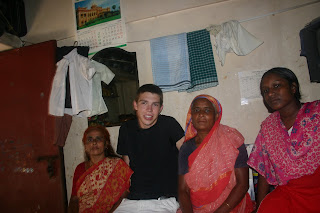.jpg) As I've been swamped with work since returning from "The Field" as researchers call it, I'm just now getting around to telling you about my four days in villages around Netrokona (3 hours north of Dhaka) and a small village three more hours from there over bumpy and mostly non-lighted roads.
As I've been swamped with work since returning from "The Field" as researchers call it, I'm just now getting around to telling you about my four days in villages around Netrokona (3 hours north of Dhaka) and a small village three more hours from there over bumpy and mostly non-lighted roads.I heard uplifting stories, like that of Shuzana's family. Shuzana is 20 years old and has no education (45% of all people I interviewed had no education). As a part of BRAC's Targeting the Ultra Poor (TUP) program, she was a recipient of two cows, and three sheets of tin so that she could make a house for the cows connected to her own. After selling milk she graduated out of TUP and was able to take microloans as a part of the Dabi microfinance program. She first took a loan of 4,000 Taka ($60) to start up her
 husband's tea shop, and then took another 6,000 Taka loan to equip it with a table and chairs. Next came a 10,000 Taka loan to purchase a TV and CD player. Every week she is paying 250 Taka, and is saving 30 Taka, as part of BRAC's program. Her husband's business is now successful and she plans to continue saving until she has enough money to send her daughters to college and eventually marry them.
husband's tea shop, and then took another 6,000 Taka loan to equip it with a table and chairs. Next came a 10,000 Taka loan to purchase a TV and CD player. Every week she is paying 250 Taka, and is saving 30 Taka, as part of BRAC's program. Her husband's business is now successful and she plans to continue saving until she has enough money to send her daughters to college and eventually marry them.There were also less happy stories. Mojibo, age 42, is the head of his household and owns a small grocery store to support his family. His wife took out two loans from BRAC to help her husband's business, but tragedy recently struck, as their son was afflicted with tetanus (this is the first picture, the son is in blue shorts). They needed $1,000 to treat him - over three times what the family earns in a given year. To get their son medical treatment, the family had to sell some of their land and take out massive loans from relatives. They are now nearly $500 in debt and the father has had to essentially cease his grocery business since he does not have the funds to purchase all the products.

Lastly I got to hang with a woman who's birth predates the Bill of Rights. She was 104 years old,
 and still kicking. Her son, who was one of only two surviving children out of 10, said that she only needs help with pumping water from a tube well and washing her clothes...everything else - cooking, cleaining, walking - she could do herself. She was actually pretty talkative, although you had to quiet down to hear her. Very impressive for someone living in a third world country.
and still kicking. Her son, who was one of only two surviving children out of 10, said that she only needs help with pumping water from a tube well and washing her clothes...everything else - cooking, cleaining, walking - she could do herself. She was actually pretty talkative, although you had to quiet down to hear her. Very impressive for someone living in a third world country.
















